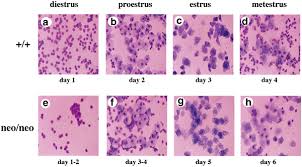estrus
英 ['estrəs]
美 ['estrəs]
- n. 发情期;动情周期

中文词源
estrus 雌性动物发情期
来自PIE*eis, 发情,激情,词源同ire. 可能来自PIE*aidh, 燃烧,词源同edifice, ether.
英语词源
- estrus (n.)
- 1850, "frenzied passion," from Latin oestrus "frenzy, gadfly," from Greek oistros "gadfly; breeze; sting; anything which makes one mad, mad impulse," perhaps from a PIE *eis- (1), forming words denoting passion (see ire). First attested 1890 with specific meaning "rut in animals, sexual heat." Earliest use in English (1690s) was for "a gadfly." Related: Estrous (1900).
权威例句
- 1. The next estrus was delayed.
- 下一次发情推迟了.
- 2. A cow's estrus cycle averages 21 days.
- 母牛的发情周期平均为21天.
- 3. Anestrus ( absence of estrus ) is not a disease but a sign of a variety of conditions.
- 乏情不是一种疾病,而是一种多方面的体态迹象.
- 4. In cows and many other animals, the female is in estrus just before ovulation.
- 母牛和许多其他的雌性动物都正好是在排卵前发情.
- 5. During estrus, the female is fertile and will accept a male.
- 在发情期, 母犬可以接受交配并且具有生育能力.
